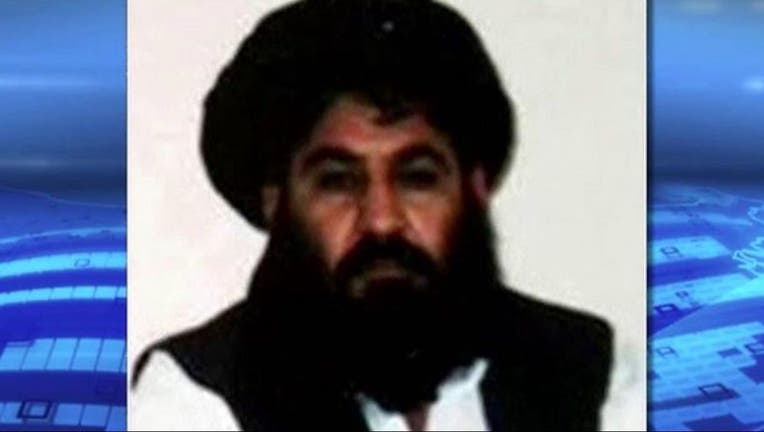Afghanistan official confirms death of Taliban leader Mansour

KABUL, Afghanistan (AP) -- The Afghan government and a senior Taliban commander confirmed Sunday that the extremist group's leader, Mullah Mohammed Akhtar Mansour, has been killed in a U.S. drone strike.
Mullah Abdul Rauf, who recently reconciled with Mansour after initially rebelling against his ascension to the leadership, told The Associated Press that Mansour died in the strike late Friday "in the Afghanistan-Pakistan border area."
Afghanistan's intelligence agency announced that Mansour had been killed in an air attack Saturday afternoon.
In a statement, the National Directorate of Security, as the secret service is known, said the attack took place in Baluchistan province, in southwestern Pakistan.
It is believed to have been the first drone strike on Baluchistan, which could explain why Mansour was traveling in an unarmored car without a convoy, decoys or bodyguards.
Ahead of the official confirmation of Mansour's death, U.S. Secretary of State John Kerry, speaking in Myanmar Sunday, repeatedly referred to him in the past tense.
Mansour, he said "posed a continuing imminent threat to U.S. personnel in Afghanistan, Afghan civilians, Afghan security forces" and members of the U.S./NATO coalition.
He said the air strike on Mansour "sends a clear message to the world that we will continue to stand with our Afghan partners."
"Peace is what we want, Mansur was a threat to that effort," Kerry said. "He also was directly opposed to peace negotiations and to the reconciliation process. It is time for Afghans to stop fighting and to start building a real future together."
Mansour formally led the Taliban after the death was announced last summer of Mullah Mohammad Omar, the movement's founder.
Mansour, Mullah Omar's deputy, concealed the Taliban founder's death for more than two years, and ran the Taliban in his name until the death was revealed by the Afghan government.
The revelation caused wide fissures in the movement that Mansour worked hard to mend.
Mullah Rauf was an early detractor of Mansour's but decided earlier this year to declare loyalty to him in the interest of unifying the movement.
Speaking live on television as he chaired a Cabinet meeting, Afghan Chief Executive Abdullah Abdullah said Mansour's death would have a positive impact on attempts to bring peace to Afghanistan, where the Taliban have been waging an insurgency for 15 years.
Mansour was "the main figure preventing the Taliban joining the peace process," Abdullah said. "From the day he took over the Taliban following the death of Mullah Omar, he intensified violence against ordinary citizens, especially in Afghanistan."
The drone strike targeted Mansour's vehicle which was carrying Mansour and one other person at the time, a U.S. military source said.
Another Taliban source identified the driver as Muhammad Azam Hasanai, and said the vehicle the two men were traveling in was completely destroyed. Photographs showed the twisted and burned wreckage of the vehicle, alongside deep holes in the road.
Mansour's death has raised questions about the direction the Taliban will take, after Ghani last month sharply changed course from pursuing peace to blaming Islamabad for using the Taliban to wage war on Afghanistan.
After taking office in 2014, Ghani prioritized appeasing the Pakistani authorities in the hope that they would encourage the Taliban to participate in a dialogue aimed at ending the war. Overtures to Islamabad failed, however, and earlier this year Mansour's Taliban said that they rejected peace talks and would not participate.
A four-country process with Afghanistan, Pakistan, China and the United States appears to have floundered, with Kabul refusing to send a delegation to the most recent round of talks, sending only the ambassador to Islamabad.
A senior Afghan official, who also spoke only on condition of anonymity, said Mansour controlled a substantial financial empire, largely built on smuggling drugs produced in southern Afghanistan's Helmand province. Different Taliban factions have recently fought over control of smuggling routes, the official said, an indication that the group's ideological discipline and unity was slipping.
"When they started fighting for power, that was the erosion of the legitimacy of their own rank and file," he said.
The official said there had been a recent shift in the balance of power from Mansour to his deputy, Surajuddin Haqqani, a leader of the notoriously brutal Haqqani network which is affiliated with al-Qaida.
It is not clear, however, which commander or faction will now take over the leadership of the group.
Mullah Mohammad Yaqub, the son of Taliban founder Mullah Omar, is popular, charismatic and believed by some officials to favor participation in a peace talks. He controls the Taliban's military commissions in 15 of Afghanistan's 34 provinces and, like Rauf, recently reconciled with Mansour.

